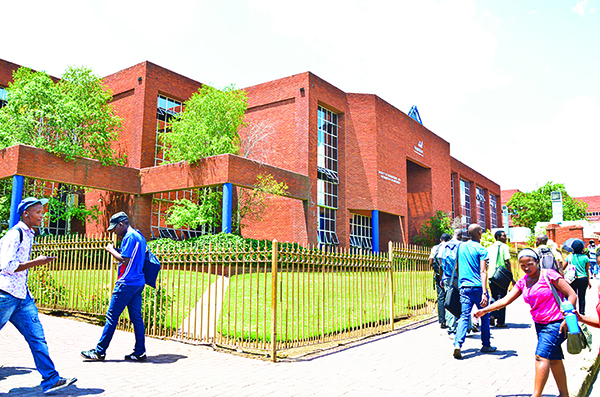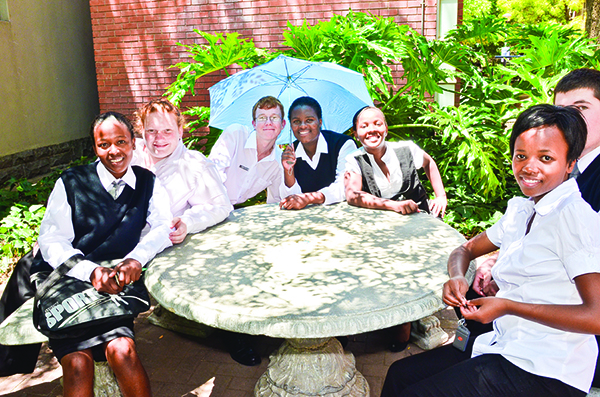Professor Thandwa Mthembu, vice chancellor and principal of the Central University of Technology. (CUT)
Since 2011 Central University of Technology (CUT), Free State has battled investigations, allegations and negativity.
The past two and half years have seen the staff and students rise up to create an institution that stands for honesty, integrity and determination.
While detractors may remain, CUT is determined to use the experience to grow as an educational facility and provide all those who walk its halls with support and understanding.
“I believe that most of our people have learned that integrity, truth and principle are virtues to live by,” says Professor Thandwa Mthembu, vice chancellor and principal of CUT.
“I think that through this process our staff and students now have a better understanding of the importance of the rule of law and how disputes need to be resolved, which is through reason and logic.”
Allegations against CUT
The allegations began in February 2011 when an anonymous letter was submitted to the minister of higher education and training, Blade Nzimande, alleging that there was maladministration, financial mismanagement, misuse of public funds, violation of human rights and labour laws, violation of CUT’s policies and procedures, and a culture of fear, intimidation and victimisation and nepotism.
The minister sent this on to the CUT council for investigation and it duly appointed audit, tax and advisory firm KPMG to undertake a thorough analysis of the situation.
When KPMG failed to produce a report by 2 September 2011 when the next Council meeting was to be held, Council terminated its mandate.
It then subsequently appointed Adv. Jannie Lubbe to continue with the investigation.
In 2012, the minister appointed Professor Julian Smith as an independent assessor and later attempted to appoint Professor Stanley Ridge as an administrator for CUT.
The council did not permit the latter to take up his role within the university and the entire issue was remanded to court to be reviewed by Justice Johann Daffue.
On August 13 2012 Daffue found in favour of the CUT council, placing both the members of the council and Mthembu back in authority and clearing their names.
Subsequent to the Daffue ruling, the minister was granted leave to appeal at the Supreme Court of Appeals, however he withdrew this on May 2 2013 and the judgement is now the final resolution on the matter.
Furthermore, on August 13 2012 Judge Daffue noted in his judgement that the Council should further investigate some matters and they immediately appointed one of the most experienced lawyers at the Bloemfontein Bar, Advocate Hans de Bruin, to investigate.
De Bruin submitted his report to the council on May 31 2013 and found no evidence or cause for concern on all the matters, and June 7 2013 finally saw the end of this issue for CUT when Council accepted the de Bruin report.
Exciting change
CUT believes that this decision was in the best interests of the ministry and the university, allowing everyone to put 2012 firmly in the past and strive towards a shared vision of the future.
Both the ministry and CUT believe in providing quality education to the youth of South Africa and have been working together to approve nine new user-focused and demand driven academic programmes for 2014 and 2015.
“The Minister and his department are an important stakeholder in higher education and CUT hopes that 2013 will see an enhanced relationship between us and the department of higher education and training,” says Mthembu.
“CUT welcomes the support that he has been providing to the students since 2010 and appreciates the fact that young people in this province are given educational opportunities that they would not otherwise have.”
Throughout the years that led to the resolution of the claims, and the subsequent investigations into the allegations laid out by the anonymous letter, CUT and the council worked hard to provide as much documentation and evidence as possible.
“Administrative and financial prudence, evidence-based transactions and engagements and impeccable record keeping, among others, are what won CUT this case,” says Mthembu.
“I am grateful that during this whole period there was not a single disruption of the university activities.”
CUT seeks to uphold strong educational values and continues to provide students with the highest levels of teaching and qualifications.
The university did not allow the situation to impact their continued development of the university and some sterling initiatives took flight during this difficult time.
The silver lining
“The allegations found us in the middle of a curriculum transformation exercise called Strategic Transformation of Educational Programmes and Structures (Steps),” says Mthembu.
“We are not aware of any university in this country that has recently undertaken a similar and as radical an exercise, other than the usual tweaks and revisions of curricula.”
The period also coincided with CUT’s rollout of vision 2020, an exciting programme that allows staff and students creative flexibility and explores their ideas in a supportive environment.
The ordeal has not created a time of stagnation and fear, but rather of exciting growth and change. For Mthembu the negativity caused by the investigation saw some remarkable student responses that still resonate with him today.
“Some of the student leaders wrote very principled newspaper articles calling for calm, rationality and a fair chance for CUT to deal with the matter without the minister’s interference,” he says.
“To me, this exhibited a level of maturity and adherence to principle that you don’t easily find in a student movement. They didn’t blindly come to a leader’s defence; instead they wanted the right processes to take their course.”
“What was most impressive with our students is that in the midst of the June 2012 gazette, in which an administrator was appointed, our students were in the middle of their mid-year examinations and proceeded without a glitch,” says Mthembu.
The experience may have held a dark cloud over CUT for several years, but the mood of the university is almost at odds with what you would have expected after such a gruelling process. There was, for this university, a silver lining after all.
The council and management have dissuaded strikes or protests, they encouraged faith in the system and processes, and it worked.

Students in various CUT activities

